人教版七年级英语下册:Unit4SectionA
人教版英语七下课件Unit_4_Don't_eat_in_class_Section_A新版义务教科书初一英语下册

3c.Makeupfivecoolrulesforyourdreamschool
.Shareyourruleswiththeclass.Yourclassmate svotefortheCoolestSchool!
1. Wecaneatinclass. 2. Wedon’thavetocometos
Whatelsedoyouhavetodo?
1.Don’tforgettoturnoffthelight whenyouleave. 2.Don’tdrawonthewall. 3.Don’twatchTVafterschool. 4.Don’tplayfootballinthestreet. 5.Youmustgetupearly. ……
• eatinclass • listentomusicoutside • wearhatsinschool • fightinclass • speakloudlyinthe library
GrammarFocus
Don’truninthehallways. Don’tfight.
Whataretherules?
Wecan’trulethecountrywithoutrules. 没有规章制度就不能治理好国家。
keeprules breakrules schoolrules classrules familyrules libraryrules diningrules
遵守规则 违反规则 校规 班规 家规 图书馆规则 就餐规则
Don’tlistentomusicintheclassroom.
点此播放动画视频
Don’truninthehallways.
Don’teatintheclassroom.
Unit4SectionA1a1c课件人教版英语七年级下册

个人抢答 +2分
We can’t run in the hallways. Don’t run in the hallways.
个人抢答 +2分
We can’t arrive\be late for class.
2. What about Amy? Is it OK to eat in the classroom? She’s eating in the classroom. It’s not OK.
3. What rule is Mike breaking?
He’s listening to music in class.
Don’t arrive\be late for class.
个人抢答 +2分
We can’t fight. Don’t fight .
She is eating an
Dave and Tom
apple .
They’re fighting .
What are thSeelyinadoing now (他
Can we fight at school? No, we can’t.
We can’t fight. Don’t fight .
个人抢答 +2分
We can’t listen to music in class. Don’t listen to music in class.
个人抢答 +2分
*图书馆规则* Don’t talk .
Don’t listen to music
Don’t eat or drink
人教版英语七年级下册Unit4 SectionA(Grammar Focus-3c)精品教案

…
2. Ss finish off the sentences and check the answers by themselves.
3. Give eight more minutes for the Ss to remember the sentences.
2.Work on 3b:
T: Use the words to make questions about the rules. Then write answers according to your school. For examplave to/ in the library)
能力目标:
能合理使用目标语言谈论对某些规章制度(校规、家规等)的看法。
情感目标:
理解没有规矩不成方圆;无论是在学校时还是在家庭中以及以后走上社会都应当遵守规则,按规则办事。
教学重点
1) 继续学习使用目标语言谈论对某些规章制度(校规、家规等)的看法
2) 通过不同方式的练习方式来学会用英语表达一些标志的含义。
Ss work in pairs. Ask and answer the sentences.
3.Work on 3c: Game
Everybody has a dream school. Suppose you’re the headmaster of the Coolest School. You can make rules for your school. Make up five cool rules for your dream school.
Ss discuss the pictures and make some rules.
Unit+4SectionA+Grammar-3c课件++2023-2024学年人教版英语七年级下册

3b
Use the words to make questions about the rules. Then write answers according to your school.
1. Be quiet? (she/have to /in the library) Q: Does she have to be quiet in the library? A: Yes, she does.
9. 是的,必须。/ 不,不必。 _Y__e_s_,__h_e__d_o_e_s_.__/__N_o_,__h_e__d_o_e__s_n_’t_._
10. 你们必须做什么?
_W__h_a_t__d_o__y_o_u__h_a__v_e__to__d__o_?______ 11. 在图书馆里我们必须保持安静。
7. 我们可以在上课的时候带帽子吗? _C_a_n__w_e__w__e_a_r__a__h_a_t__in__c_l_a_s_s_?__
8. 他在学校里必须穿校服吗? _D_o_e_s__h_e__h_a_v_e__t_o__w__e_a_r__a__u_n_if_o_r_m___a_t__s_c_h_o_o_l?
_W__e__h__a_v_e__t_o__b_e__q_u_ie_t__i_n__t_h_e__li_b_r_a_r_y_._
Grammar Focus
Don’t run in the hallways.
Don’t fight.
What are the rules?
We must be on time for class.
3. Where can you see these signs?
2
4
2020-2021学年人教版英语七年级下册Unit4SectionA(2a-2d)教案

-词汇:本节课的核心词汇包括tiger, elephant, panda, lion, giraffe等动物名词,以及black, white, China等形容词和名词。这些词汇是描述动物特征的基础,需要学生熟练掌握。
-句型:重点句型包括"What's this? It's a ...", "It's ... and ... It's from ..."。学生需要能够运用这些句型正确描述动物的特征和来源。
2.文化意识:通过了解不同国家的动物特点,培养学生对多元文化的认识和理解,增强国际视野。
3.思维品质:通过分析、比较动物特征,锻炼学生的观察、思考能力,培养其逻辑思维和批判性思维。
4.学习能力:引导学生运用所学知识进行自主学习,培养其合作、探究的学习方法和策略,提高解决问题的能力。
三、教学难点与重点
实践活动中的角色扮演环节,学生们表现得相当积极,课堂气氛非常活跃。通过这一活动,学生们不仅巩固了所学知识,还提高了语表达能力。但同时,我也发现部分学生在与其他同学交流时,仍然存在紧张和不自信的现象。在今后的教学中,我将更多地给予他们鼓励和支持,提高他们的自信心。
学生小组讨论环节,大家围绕“动物的特点和我们的生活”展开了热烈的讨论。通过这一过程,学生们学会了如何与他人合作、倾听他人意见,并提出了很多有创意的想法。但在讨论过程中,我也观察到有些学生参与度不高,可能是由于他们对主题不够感兴趣或者不知道如何表达自己的观点。为此,我打算在下一次的讨论中,提供更多的话题选择,让学生们能够选择自己感兴趣的方向。
2.句型:掌握描述动物特征的句型,如"It's black and white. It's from China."。
人教版英语七年级下册Unit4SectionA(1a1c)教学设计
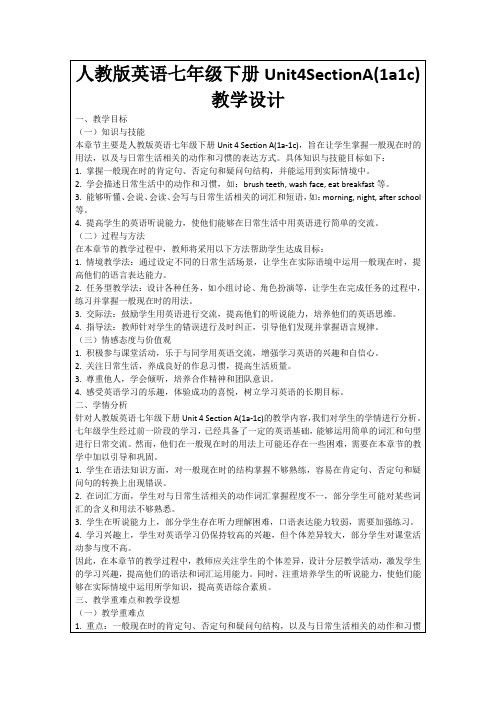
1.学生在语法知识方面,对一般现在时的结构掌握不够熟练,容易在肯定句、否定句和疑问句的转换上出现错误。
2.在词汇方面,学生对与日常生活相关的动作词汇掌握程度不一,部分学生可能对某些词汇的含义和用法不够熟悉。
3.学生在听说能力上,部分学生存在听力理解困难,口语表达能力较弱,需要加强练习。
4.学习兴趣上,学生对英语学习仍保持较高的兴趣,但个体差异较大,部分学生对课堂活动参与度不高。
人教版英语七年级下册Unit4SectionA(1a1c)教学设计
一、教学目标
(一)知识与技能
本章节主要是人教版英语七年级下册Unit 4 Section A(1a-1c),旨在让学生掌握一般现在时的用法,以及与日常生活相关的动作和习惯的表达方式。具体知识与技能目标如下:
1.掌握一般现在时的肯定句、否定句和疑问句结构,并能运用到实际情境中。
(三)学生小组讨论
1.教师将学生分成若干小组,每组选择一个话题,如:早晨、中午、晚上或周末的日常活动。
2.各小组用一般现在时讨论话题,每位同学都要参与讨论,记录下组员的日常习惯。
3.讨论结束后,各小组派一名代表汇报讨论成果,其他同学认真倾听,互相学习。
(四)课堂练习
1.教师发放练习题,包括一般现在时的肯定句、否定句和疑问句转换,以及与日常生活相关的动作词汇填空。
2.学会描述日常生活中的动作和习惯,如:brush teeth, wash face, eat breakfast等。
3.能够听懂、会说、会读、会写与日常生活相关的词汇和短语,如:morning, night, after school等。
4.提高学生的英语听说能力,使他们能够在日常生活中用英语进行简单的交流。
人教版英语七年级下册Unit4SectionA3a3c说课稿

3.课堂展示:鼓励学生展示自己的作业和成果,培养他们的自信心和表达能力;
4.课后交流:利用班级群等平台,鼓励学生课后进行英语交流,分享学习心得和经验。
四、教学过程设计
(ቤተ መጻሕፍቲ ባይዱ)导入新课
为了快速吸引学生的注意力和兴趣,我将采用以下方式导入新课:
(二)教学反思
在教学过程中,我预见到以下可能出现的问题或挑战:
1.部分学生对一般现在时态的掌握不够熟练,可能会出现语法错误;
2.学生在口语表达中可能存在词汇量不足、语调不准确等问题;
3.课堂时间有限,难以保证每个学生都有足够的实践机会。
应对措施:
1.针对语法错误,设计专项练习,加强学生的语法训练;
2.通过丰富多样的课堂活动,提高学生的词汇量和口语表达能力;
2.教师点评:针对学生的表现,给予积极评价和指导,强调学习重点,指出易错点;
3.同伴互评:鼓励学生相互评价,提出建议和改进措施;
4.提供有效反馈:针对学生的疑问和错误,给予针对性的解答和指导,帮助学生巩固知识点。
(五)作业布置
课后作业布置如下:
1.复习本节课所学的词汇和句型,进行口头练习;
2.完成一篇关于自己业余生活的短文,使用一般现在时描述;
教学难点:1.一般现在时的正确运用,特别是第三人称单数的变化;2.对话交流中词汇和句型的灵活运用;3.口语表达中的语法和语调。
二、学情分析导
(一)学生特点
本节课面向的是七年级下册的学生,他们大多处于青春期初期,好奇心强,求知欲旺盛,具备一定的自主学习能力。在认知水平上,学生已经掌握了一定的英语基础知识,能够进行简单的日常交流,但对于复杂的语法结构和词汇运用尚需进一步指导。在学习兴趣上,学生对英语学习有着浓厚兴趣,尤其是与生活实际相结合的内容,如业余生活话题。在学习习惯上,学生已经养成了课堂参与、合作学习和预习复习的好习惯,但仍需教师在教学中加以引导和督促。
人教版初中英语七年级下册Unit4SectionA教材全解
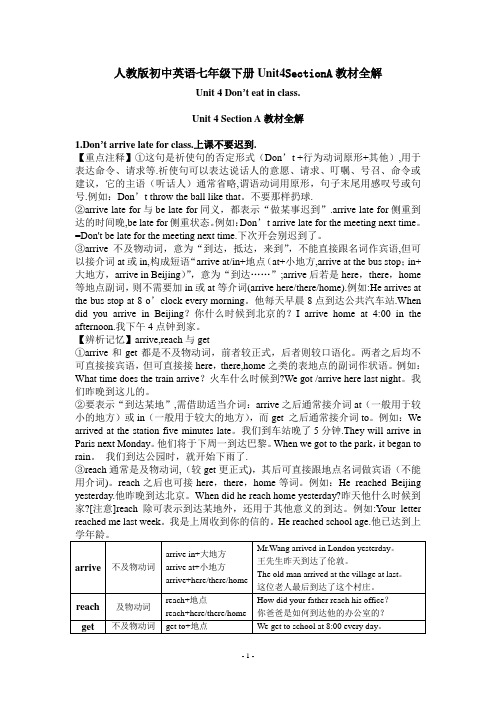
人教版初中英语七年级下册Unit4SectionA教材全解Unit 4 Don’t eat in class.Unit 4 Section A教材全解1.Don’t arrive late for class.上课不要迟到.【重点注释】①这句是祈使句的否定形式(Don’t +行为动词原形+其他),用于表达命令、请求等.祈使句可以表达说话人的意愿、请求、叮嘱、号召、命令或建议,它的主语(听话人)通常省略,谓语动词用原形,句子末尾用感叹号或句号.例如:Don’t throw the ball like that。
不要那样扔球.②arrive late for与be late for同义,都表示“做某事迟到”.arrive late for侧重到达的时间晚,be late for侧重状态。
例如:Don’t arrive late for the meeting next time。
=Don't be late for the meeting next time.下次开会别迟到了。
③arrive不及物动词,意为“到达,抵达,来到”,不能直接跟名词作宾语,但可以接介词at或in,构成短语“arrive at/in+地点(at+小地方,arrive at the bus stop;in+大地方,arrive in Beijing)”,意为“到达……”;arrive后若是here,there,home 等地点副词,则不需要加in或at等介词(arrive here/there/home).例如:He arrives at the bus stop at 8 o’clock every morning。
他每天早晨8点到达公共汽车站.When did you arrive in Beijing?你什么时候到北京的?I arrive home at 4:00 in the afternoon.我下午4点钟到家。
人教版英语七年级下册Unit4听力原文及翻译
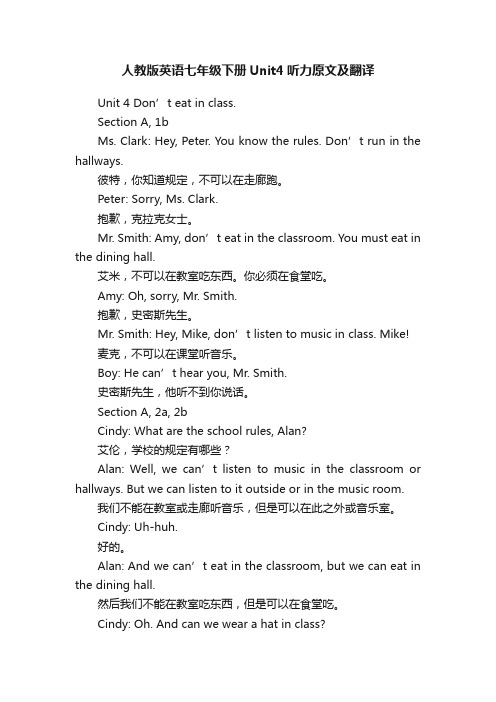
人教版英语七年级下册Unit4听力原文及翻译Unit 4 Don’t eat in class.Section A, 1bMs. Clark: Hey, Peter. You know the rules. Don’t run in the hallways.彼特,你知道规定,不可以在走廊跑。
Peter: Sorry, Ms. Clark.抱歉,克拉克女士。
Mr. Smith: Amy, don’t eat in the classroom. You must eat in the dining hall.艾米,不可以在教室吃东西。
你必须在食堂吃。
Amy: Oh, sorry, Mr. Smith.抱歉,史密斯先生。
Mr. Smith: Hey, Mike, don’t listen to music in class. Mike!麦克,不可以在课堂听音乐。
Boy: He can’t hear you, Mr. Smith.史密斯先生,他听不到你说话。
Section A, 2a, 2bCindy: What are the school rules, Alan?艾伦,学校的规定有哪些?Alan: Well, we can’t listen to music in the classroom or hallways. But we can listen to it outside or in the music room.我们不能在教室或走廊听音乐,但是可以在此之外或音乐室。
Cindy: Uh-huh.好的。
Alan: And we can’t eat in the classroom, but we can eat in the dining hall.然后我们不能在教室吃东西,但是可以在食堂吃。
Cindy: Oh. And can we wear a hat in class?那么我们能在课堂上戴帽子吗?Alan: No, we can’t. What else? Oh, you can’t fight with your classmates. That makes the teachers really unhappy.不能。
初中英语人教版七年级下册unit4 section A1a--2c
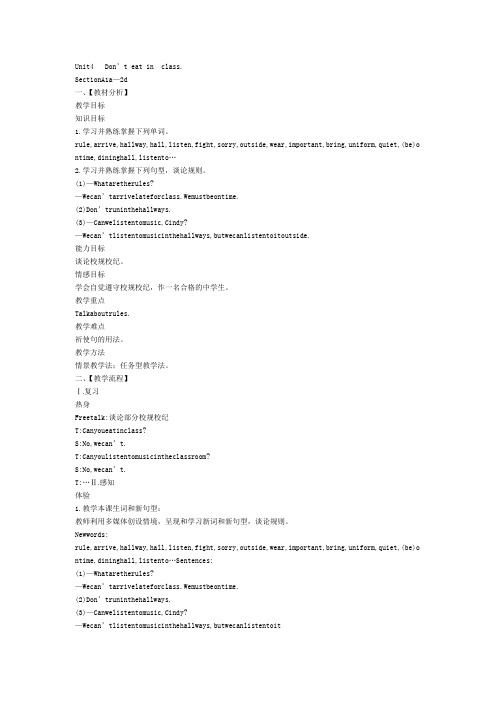
Unit4 Don’t eat in class.SectionA1a—2d一、【教材分析】教学目标知识目标1.学习并熟练掌握下列单词。
rule,arrive,hallway,hall,listen,fight,sorry,outside,wear,important,bring,uniform,quiet,(be)o ntime,dininghall,listento…2.学习并熟练掌握下列句型,谈论规则。
(1)—Whataretherules?—Wecan’tarrivelatef orclass.Wemustbeontime.(2)Don’truninthehallways.(3)—Canwelistentomusic,Cindy?—Wecan’tlistentomusicinthehallways,butwecanlistentoitoutside.能力目标谈论校规校纪。
情感目标学会自觉遵守校规校纪,作一名合格的中学生。
教学重点Talkaboutrules.教学难点祈使句的用法。
教学方法情景教学法;任务型教学法。
二、【教学流程】Ⅰ.复习热身Freetalk:谈论部分校规校纪T:Canyoueatinclass?S:No,wecan’t.T:Canyoulistentomusicintheclassroom?S:No,wecan’t.T:…Ⅱ.感知体验1.教学本课生词和新句型:教师利用多媒体创设情境,呈现和学习新词和新句型,谈论规则。
Newwords:rule,arrive,hallway,hall,listen,fight,sorry,outside,wear,important,bring,uniform,quiet,(be)o ntime,dininghall,listento…Sentences:(1)—Whataretherules?—Wecan’tarrivelateforclass.Wemustbeontime.(2)Don’truninthehallways.(3)—Canwelistentomusic,Cindy?—Wecan’tlistentomusicinthehallways,butwecanlistentoitoutside.2.Makeconversations.(1)—Don’trunint hehallways.—Sorry,Ms.Clark.(2)—Whataretherules?—Well,wecan’tarrivelateforclass.Wemustbeontime. (3)—Canwelistentomusic,Cindy?—Wecan’tlistentomusicinthehallways,butwecanlistentoitoutside.3.Makealistofschoolrules:(1)Don’tarrivelateforclass.Youmustbeont ime.(2)Don’truninthehallways.(3)Don’teatintheclassroom.Youmusteatinthedininghall.(4)Don’tlistentomusicinclass.(5)Don’tfight.Ⅲ.强化巩固1a:Whichrulesarethesestudentsbreaking?Writethenumberoftherulenexttothestudent. 学生独立完成并合作讨论答案,教师检查。
Unit+4+section+AGrammar+Focus-3c 人教版七年级下册英语
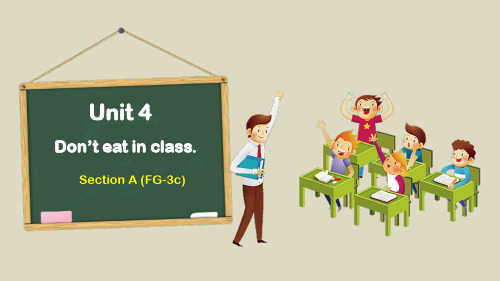
Don’t arrive late for class. You must be on time.
School rules
1. Don’t arrive late for class. 2. Don’t run in the hallways. 3. Don’t eat in the classroom. 4. Don’t listen to music in the
wear the school uniform She m__u_s_t wear the school uniform at school.ห้องสมุดไป่ตู้She _h_a_s_t_o__ wear the school uniform at school.
She _dn_moe_ee_uds_snn_t'n'_tt'_tn_e_e_d_t_o__不_w准e,ar禁th止e school uniform outside. She _d_o_e_s_n_'_t_h_a_v_e_t_o_wear the school uniform outside.
Chinese
遵守学校规则 上课迟到 准时 在走廊里 在餐厅里 听音乐 和某人打架
Don’t arrive late for class.
Don’t _e_a_t_in the classroom.
Don’t__fi_g_h_t_.
Don’t_li_s_te_n__t_o_m__u_s_ic in class.
人教七年级英语下册 Unit 4 Section A 知识点总结精讲(共54张PPT)

A. in
B. to
C. at
②He gets to the city by train. (改为同义句)
D. of
He arrives in the city by train.
2. You must be on time. 你必须准时。 (1)on time“准时”, 指按照规定的时间做某事。例如: Please come here on time tomorrow. 请明天按时来这里。 We must get to school on time. 我们必须按时到校。
【活学活用】
①It’s important to be
for the meeting.
A. on time
B. in time
C. at any time
D. at the same time
②The firemen(消防员) got to the factory
We can eat in the dining hall.
We can listen to music in the music room.
School rules
1. Don’t arrive late for class. You must be on time. 2. Don’t run in the hallways. 3. Don’t eat in the classroom. You must eat in the dining hall. 4. Don’t listen to music in class.
1 Do型祈使句
肯定句:动词原形+宾语+其他. 否定句:Don’t +动词原形+宾语+其他. eg: Listen to music in the music room.
人教版七年级英语下册Unit 4 Don’t eat in class. Section A 课件2
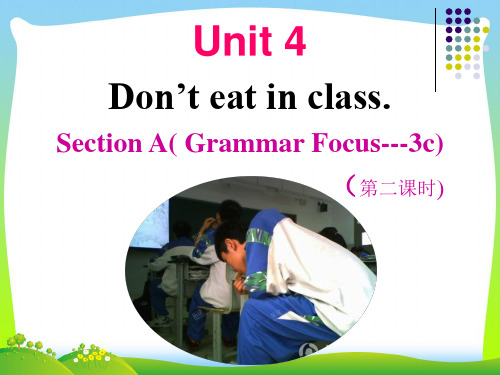
1. 肯定祈使句的常见句型结构: ① Do型:动词原形+宾语+其他. 如:
Open the door, please. ② Be型:Be+表语. 如:
Be a good boy! ③ Let型:Let+宾语+动词原形+其他.如:
Let me help you.
(或:Let’s+动词原形+其他.) 如: Let’s play tennis.
3. Listen to music? Q:_C__an__w_e_l_is_te_n_t_o_m_u_s_i_c _in_t_h_e_h_a_ll_w_a_ys_?___
(we/ can/ in the hallways)? A: N__o,_w_e_c_a_n_’t_. _______
4. Wear a hat? Q: _C_a_n_w_e__w_e_a_r a_h_a_t_in_t_h_e_c_la_s_s_ro_o_m_?_____
17、儿童是中心,教育的措施便围绕他们而组织起来。2021/7/202021/7/202021/7/202021/7/20
2、Our destiny offers not only the cup of despair, but the chalice of opportunity. (Richard Nixon, American President )命运给予我们的不是失望之酒,而是机会之杯。二〇二一年六月十七日2021年6月17日星期四 3、Patience is bitter, but its fruit is sweet. (Jean Jacques Rousseau , French thinker)忍耐是痛苦的,但它的果实是甜蜜的。10:516.17.202110:516.17.202110:5110:51:196.17.202110:516.17.2021 4、All that you do, do with your might; things done by halves are never done right. ----R.H. Stoddard, American poet做一切事都应尽力而为,半途而废永远不行6.17.20216.17.202110:5110:5110:51:1910:51:19 5、You have to believe in yourself. That's the secret of success. ----Charles Chaplin人必须相信自己,这是成功的秘诀。-Thursday, June 17, 2021June 21Thursday, June 17, 20216/17/2021
人教版七年级英语下册教学课件《Unit 4 Section A 1a-1c》
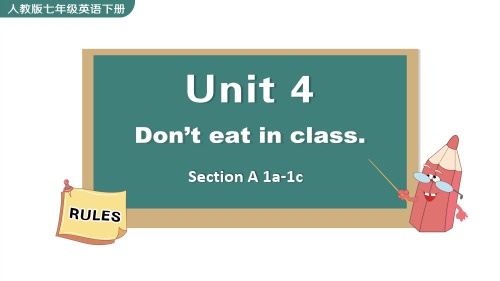
违反规章
school rules 校纪 = the rules of the school class rules 班规 = the rules of the class ※ rule还可以用作动词,意为“统治,支配”。 e.g. The king ruled the country 500 years ago.
2. It’s very hot outside. You __c_a_n__ wear a hat. 3. We _c_a_n_’_t_ eat in the classroom, because it’s
impolite to teachers. 4. I _c_a_n_’_t_ go to bed after 11:00 on school night. 5. The students __c_a_n__ read books and magazines
I never heard such an interesting story. 我从来没听过这么有趣的一个故事。
2) listen“听” 侧重于“听”这一动作。例如: Listen to me carefully. 认真听我说。
Children like to listen to music. 孩子们喜欢听音乐。 3) sound“听起来”,它是系动词,后面接形容词等。 例如: That sounds great. 那听起来真不错。 It sounds like fun. 听起来挺有趣。
2. When do you usually arrive _a_t__ the bus station?
3. Jenny’s uncle usually arrives _in__ Shanghai in the evening.
初中英语 七年级下册 Unit4 Don't eat in class

(2)意为“一定;准是”,表示肯定推 测,用于肯定句中。 这本书一定是玛丽的。
The book must be Mary’s.
2.情态动词 have to 的用法 (1) have to 意为“必须;不得不”,后接动词 原形,表示客观需要做的事情。 现在我不得不离开。 I have to leave now.
不要吵闹。 Don’t be noisy.
肯定句:
让我帮你吧。
Let+宾语+动词原形+其他. Let me help you.
Let 型 否定句:
①Don’t let+宾语+动词原 形+其他. ②Let+宾语+not+动词原 形+其他.
别让他走。
Don’t let him go./
Let him not go.
2.祈使句的句式
肯定句:
请坐。
动词原形(+宾语)+其他. Sit down, please.
Do
型 否定句:
不要在这儿跑。
Don’t +动词原形(+宾语)
+其他.
Don’t run here.
肯定句: Be +表语+其他. Be 型 否定句: Don’t + be +表语+其他.
请安静。 Be quiet, please.
Summary
语法 1. 祈使句的三种类型用法
Don’t run in the hallway. 2. 情态动词can, must, have to的用法
Can we wear a hat in class? We must be on time for class. We have to be quiet in the library.
Unit4第1课时(SectionA1a-2c)(教学设计)七年级英语下册(人教版)
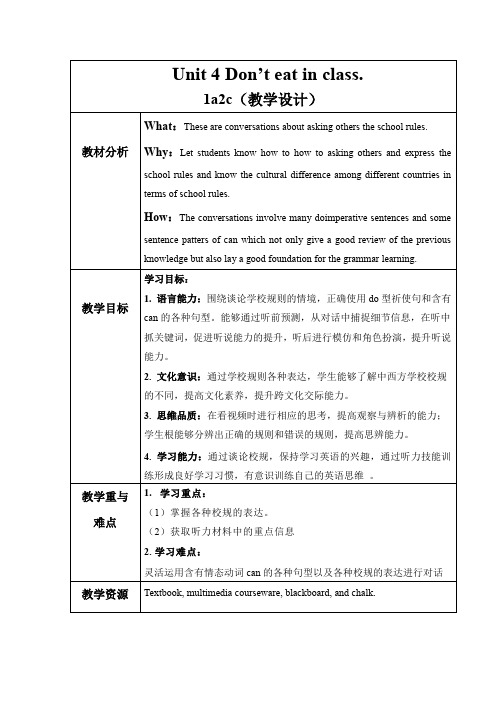
学生在看图片和思考区别时,是否表现积极主动,是否能正确的;学生是否能准确无误的完成练习。
Whilelistening (15’)
Step 5
T plays the recording in 2a for the first time to ask Ss to finish 2a.
T plays the recording for the second time to ask Ss to plete 2b. After that. T invites some Ss to show their answers.
After that, T asks Ss to think about the question:“What school rules do you know?”
Ss guess a Chinese saying and think about the question:“What school rules do you know?”
Step 2
T asks Ss to watch a video and then answer the question“What rules are talked about in this video”.
Ss watch a video and then answer the question
Homework (2’)
Level B:
1. Master what you have learned in this lesson.
2. Preview the conversation in 2d
Level A:
1. Finish the extra exercise in your workbook.
Unit+4++Section+A(Grammar+Focus~3c) 人教版七年级英语下册
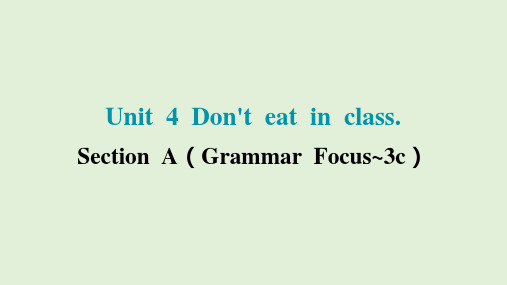
Ⅱ.根据句意填空,使句子通顺、意思完整。每空限填一词。
6.We can't eat in the classroom,_b_u_t_ we can eat in the dining hall. 7.He is a good student.He is never late _f_o_r_ class. 8.We can't wear __a_ hat in class. 9.My brother says,“Please bring my music player _t_o_ me.” 10.“Don't eat _o_r_ drink in class,” Mr.Wang says to us.
Unit 4 Don't eat in class.
Section A(Grammar Focus~3c)
课前ห้องสมุดไป่ตู้累
01 重点短语
1.保持安静 _b_e_/_k_e_e_p__q_u_ie_t_ 2.听音乐 _l_is_t_e_n__to__m__u_si_c_ 3.每天 _e_v_e_r_y__d_a_y_
here.( C )
A. must
B. needn't
C. mustn't
2.Amy has missed(错过) the last bus,so she ________ walk to
school.( B )
A. have to
B. has to
C. having to
3.You ________ get up early on weekends.You can relax.( C )
续表
词汇
含义及用法
人教版英语七年级下册Unit4sectionA1a2c基于标准的教学和评价优秀教学案例

在小组讨论结束后,我邀请各小组代表进行汇报,并对他们的表现给予肯定和鼓励。随后,我进行总结归纳,强调本节课的重要知识点和交际策略。我通过提问、回答等方式,检查学生对知识的掌握程度,并及时解答他们的疑问。
(五)作业小结
最后,我布置了相关的作业,让学生巩固所学知识。作业包括抄写购物词汇、编写购物场景的小对话等。同时,我提醒学生要注重在实际生活中运用所学知识,将英语学习与生活实际相结合。
(三)情感态度与价值观
1.学生能够认识到学习英语的重要性,激发学习兴趣,树立自信心。
2.学生能够培养良好的合作精神,学会尊重和理解他人,提高人际交往能力。
3.学生能够在购物场景中,运用所学知识,展现自己的文明礼仪和良好风貌。
在教学过程中,我注重培养学生的情感态度和价值观。通过创设真实、生动的学习情境,让学生在轻松愉快的氛围中学习,从而激发他们的学习兴趣,树立自信心。同时,我还注重培养学生的合作精神,使他们在小组活动中学会尊重和理解他人,提高人际交往能力。在购物场景中,学生能够运用所学知识,展现自己的文明礼仪和良好风貌,培养良好的社会公德心。
4.多元评价:采用自评、互评和他评相结合的方式,使评价更加客观、公正,有助于学生全面了解自己的学习情况,提高自信心。
5.教学策略灵活运用:结合学科和课本内容,运用情景创设、问题导向、小组合作等教学策略,使教学过程丰富多彩,提高了学生的学习效果。
在教学过程中,我以课程标准为导向,遵循“以学生为中心”的教学原则,结合学生的实际情况,设计了一系列具有针对性和实用性的教学活动。通过创设真实、生动的学习情境,引导学生积极参与课堂互动,提高他们的语言实践能力。同时,我注重对学生进行形成性评价,关注他们在学习过程中的进步与成长,旨在帮助他们建立自信心,激发学习兴趣。
人教版七年级英语下册Unit 4 Don't eat in class Section A 课件

5. Jack, ________ to be here at 8 o'clock
A. is sure
B. sure
C. be sure
D. are sure
6. ____ go to the store. Let sb. do sth.
A. Let's B. Don't let they C. Let we D. No let me
感叹句:Nice to meet you!
祈使句
祈使句一般用来表示请求、命令、劝说、号召、警告等。 肯定式:(You) + v. +... 否定式:(You) + don't + v. + ...
在祈使句中, 通常省略第二人称主语you。 肯定式以动词原形开头,否定式一般在动词原形前加don't。
Don't _a_r_r_iv_e__/ _b_e_l_a_te__f_o_r (迟到) class.
We can _a_r_ri_v_e_h_o_m__e_ (到家) at 8:00 p.m..
2. They always fight f_o_r_ (介词) money.
fight with sb. 和... 打架;和...共同战斗
2. 不要D在oin晚g s饭po后rts吃is g冰oo激d f凌or。our health.
DonS'hteeias tgoicoed-wcritehacmhildarfetne.r dinner.
3. 对朋ds.
4. 让我帮助你。
Let's me (x)
1c Student A is a new student. Student B tells Student A
- 1、下载文档前请自行甄别文档内容的完整性,平台不提供额外的编辑、内容补充、找答案等附加服务。
- 2、"仅部分预览"的文档,不可在线预览部分如存在完整性等问题,可反馈申请退款(可完整预览的文档不适用该条件!)。
- 3、如文档侵犯您的权益,请联系客服反馈,我们会尽快为您处理(人工客服工作时间:9:00-18:30)。
It’slate.Imustgohomenow. 天晚了。现在我必须要回家。
练一练:用haveto,must填空 1.It’scoldoutside.We__h_a_v_e_tostayat home.
2.We_m__u_sbtegoodwithourparents.
Uh-huh.
Wecan’teatintheclassro om,butwecaneatinthedin inghall.
Oh,canwewearah atinclass?
No,youcan’t.Whatelse?Oh, youcan’tfightwithyourclass mates.Thatmakestheteachers
1.IsJohnnewatschool? ___Y__e_s,_h_e_i_s._ 2.Aretheremanyrulesatschool? ___Y__e_s,_t_h_e_re_a_r_e_.
3.Canhebrightmusicplayerstoschool? __N__o_,h_e_c_a_n_’__t_.__ 4.Dotheyhavetoalwaysweartheschoolunifor
Whataretherulesatyourschool?
Don’tfight. 不准打架.
Don’tarrivelateforclass. Don’tbelateforschool. 不准上课迟到.
Don’tlistentomusicintheclassroom.
Don’truninthehallways.
说唱下列歌谣:
Bepolitetoeachother. Wearschooluniform. Don’tbelateforschool.
Don’tsayruderemarksinschool. Don’teatsnacksinclass. Don’tshoutinclass.
GrammarFocus
阅读GrammarFocus部分,完成下列句子。
1.不要在楼道里跑。
___D_o_n_’_t_r_u_n_in__th_e_h_a_l_lw__a_y_s_. _______ 2.不要打架。
___D_o_n_’__t_f_ig_h_t_._______ 3.有什么规则?
___W__h_a_t_a_r_et_h_e_r_u_l_es_?_____________ 4.我们必须按时上课.
√
√ √ √ √
√ √
2c.Pairwork
A:Canwelistentomusic,Cindy? B:Wecan’tlistentomusicinthehallways, butwecanlistentoitoutside.
Whataretheschool rules,Alan?
Well,wecan’tlistentomusici ntheclassroomorhallways. Butwecanlistentomusicinmus icroom.
Don’teatintheclassroom.
Don’twearahatinschool.
Don’ttalkinclass.
Don’ttalkwitheachotherinclass. Stoptalking. 不准在上课讲话.
Pleasekeepquietinthelibrary. Don’tspeakloudlyinthelibrary.
1a.Writethenumber
oftherulenextto
5
thestudent.
SCHOOLRULES
1.Don’tarrivelate
3
4
forclass.Youmust
beontime.
2.Don’truninthe
hallways.
3.Don’teatinthe
classroom.Youmust
___W__e_m_u__st_b_e_o_n_t_im__e_f_o_rc_l_a_s_s._______
5.我们可以在教室里吃东西吗?
____C_a_n_w__ee_a_t_i_n_th_e_c_l_a_ss_r_o_o_m__?____ 6.不能。但我们可以在餐厅里吃东西。 ____N_o_,w__e_c_a_n_’__t,_b_u_t_w_e_c_a_n_e_a_t_in_t_h_e_d_i_n ____in_g_h_a_l_l._______________________ 7.我们可以在上课的时候带帽子吗?
m? ___Y_e_s_,_th_e_y_d_o_.___
Practice
Canwe…? Yes,wecan. No,wecan’t.
• eatinclass • listentomusicoutside • wearhatsinschool • fightinclass • speakloudlyinthe library
Alice:No,wecan’t.Andwealwayshave toweartheschooluniform. John:Isee. Alice:Oh,andwealsohavetobequietin thelibrary.
2dReadtheconversationin2d andanswerthequestions.
你和她吵过架吗?
4.wear意为“穿、戴” MyauntwearsablueskirtandawhiteTshirt. 我姑姑穿着蓝色的裙子,白色的T恤。 Doeshewearglasses? 他戴眼镜吗?
5.haveto与must 1)haveto意为“必须做某事”强调“客观需要”
Theyhavetowearschooluniformseveryday. 他们每天必须穿校服。
Don’teatintheclassroom.Youmus teatinthedininghall.
Don’truninthehallways.
1c.Pairwork
Talkabouttherulesabove.
A:Whataretherules? B:Well,wecan’t arrivelateforclass.
reallyunhappy.
Isee.
2d.Role-playtheconversation.
John:Hi,myname’sJohn.It’smyfirstday atschool. Alice:Hi,John.I’mAlice.Thisisagreat school,buttherearealotofrules. John:Really?Whataresomeoftherules? Alice:Well,don’tbelatefortheclass.This isveryimportant. John:OK,sowemustbeontime.Canwebring musicplayerstoschool?
将下列句子译成英语。
1. 不要在上课时听音乐。 ___D_o_n_’_t_li_st_e_n_t_o_m_u__si_c_in_c_l_a_s_s.__ 2.我们必须准时。 ___W__e_m__u_st_b_e_o_n_t_im__e_. _________ 3.我们能把音乐播放器带到学校里来吗? ___C_a_n_w__e_b_r_in_g_t_h_e_m__u_si_c_p_l_a_y_er_t_o_s_c_h_o_o_l?__ 4. 在图书馆里我们必须保持安静。 ___W__e_m_u_s_t_k_e_e_p_q_u_i_et_i_n_th__el_i_b_r_a_ry_.____ 5. 不要在楼道里跑。 1. __D_o_n_’_t_r_u_n_in__th_e_h_a_l_lw__a_y_s_. ___________
3.Jenny’suncleusuallyarrives___Sihnangh aiintheevening.
2.listen的用法; 1)listen听;用来提醒某人注意,后面不 跟事物。 Listen!Who’ssingingintheclassroom? 听!谁在教室里唱歌? 2)如果后面跟要听的事物,应跟介词to再 跟事物。
Wecan’trulethecountrywithoutrules. 没有规章制度就不能治理好国家。
keeprules breakrules schoolrules classrules familyrules libraryrules diningrules
遵守规则 违反规则 校规 班规 家规 图书馆规则 就餐规则
Whataretheru Well,wecan’tarrivelateforc
les?
lass.Wemustbeontime.
Don’trunintheh allways.
Whataretheo Don’teatintheclassroom therrules? Youmusteatinthedininghall.
Don’tsmoke.(Nosmoking) 不准吸烟./禁止吸烟!
Wehavetowear auniformatschool.
Wehavetocleantheclassrooms everyday.
Whatelsedoyouhavetodo?
1.Don’tforgettoturnoffthelight whenyouleave. 2.Don’tdrawonthewall. 3.Don’twatchTVafterschool. 4.Don’tplayfootballinthestreet. 5.Youmustgetupearly. ……
1.arrive到达=get(to)
1)arrive后面可以不跟到达的地点。 Don’tarrivelateforschool.不要上学迟到。 2)arrive后面也可以跟到达的地点。但后 面必须要跟介词in(大地方)或at(小地 方)。
